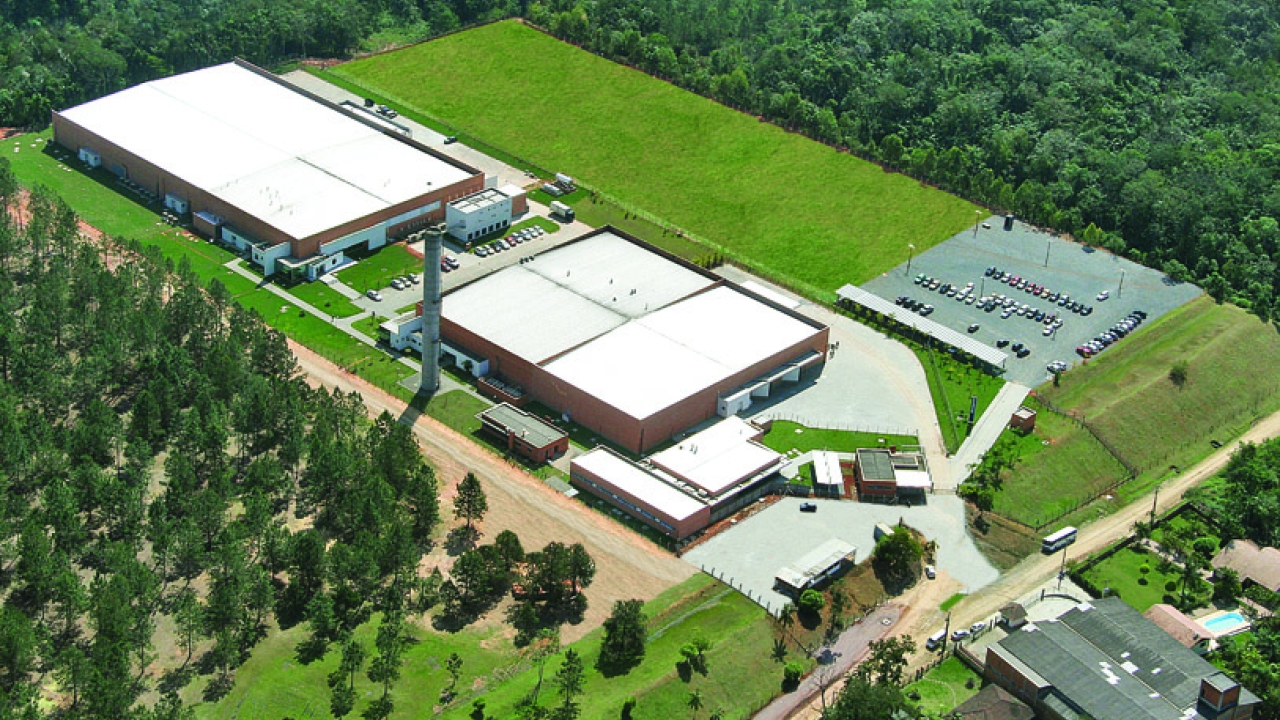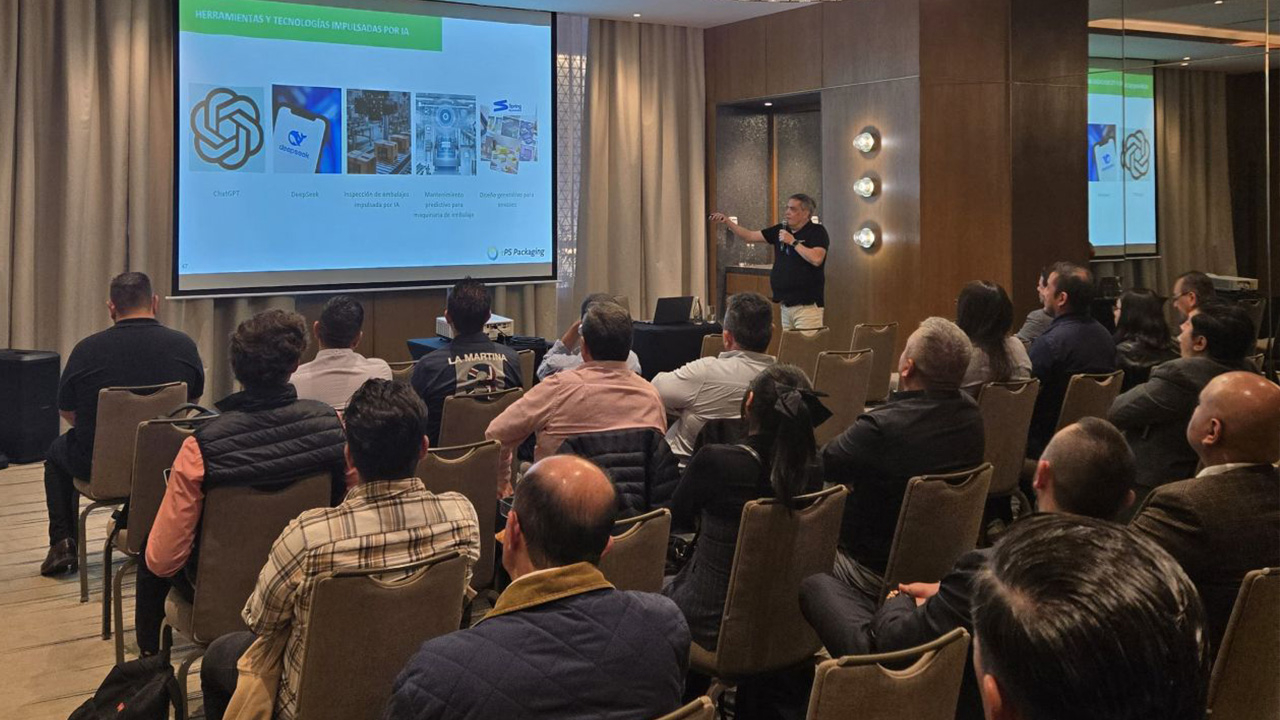Baumgarten invests for rapid expansion

Since splitting from its carton division in 2009, Brazilian label converter Baumgarten has invested heavily in new technology and implemented a world class sustainability program. Now the company has international markets in its sights, as James Quirk reports
When L&L visited Brazilian label converter Baumgarten in 2007, the company had become the first in the Americas to produce offset-printed shrink sleeves. Since then the innovation has continued, with Baumgarten, one of the region’s largest integrated package print operations, undergoing impressive expansion, investing heavily in new technology and implementing a world class sustainability program that was given international recognition by Unilever.
The dramatic changes began in 2009 when operations were split: Ronaldo Baumgarten Jr and his uncle Germano Baumgarten took over the five label and tray printing divisions, while Hercilio Baumgarten, also Ronaldo Jr’s uncle, turned the carton division into a separate entity known as CartonDruck.
Without stopping production, Ronaldo Baumgarten Jr moved the company to a 254,000 square meter plot of land that his forward-thinking father – the company’s former CEO who passed away in 2005 – had purchased in 2001, while it was still operating out of multiple sites. He appointed Fernando Gabel as managing director, purchased the shares of his uncle Germano, and the company embarked on a period of intensive investment which has seen it firmly establish itself in the upper echelon of Brazilian – indeed, global – label converters.
New sales strategies have been adopted, resulting in 70 percent growth last year in Baumgarten’s shrink sleeve production, while the company is targeting 20 percent overall growth in 2011. A further shift in culture has seen Baumgarten increase its focus on external markets, with 10 percent of production being earmarked for export in the future.
Rapid investment
Of the 15 Nilpeter MO presses installed in Brazil, six are housed in Baumgarten’s 20,000 square meter factory in Blumenau in the southern state of Santa Catarina. The company’s latest – an 11-color hybrid MO-4 press for printing pressure sensitive labels and shrink sleeves – was installed in January of this year. It followed a plethora of new machines installed in 2009 and 2010: a HP Indigo WS600 digital press with an AB Graphic Digicon Series 2 finishing line; laser engraving equipment from Stork; a Heidelberg XL75 sheetfed offset press; two Peerless cardboard thermoforming machines; a Heidelberg cut & stack machine; a Rotocontrol slitter rewinder with inspection; a Profama material cutter and three shrink sleeve finishing machines from local supplier Polisul – two for die-cutting and one for inspection. A second 8-color Gallus EM420 flexo press with silkscreen capabilities arrived in August. The investment has not been limited to machinery installations: the company has installed EskoArtwork ArtPro software, a new ERP system named Sapiens and added 8,000 square meters to its main factory.
‘There was very little investment between 2006 and 2009 following my father’s death,’ says Ronaldo Baumgarten Jr. ‘So we had to spend heavily and quickly to bring the company to a new level in a short space of time.’
The HP Indigo WS6000 was installed in September 2010 to address the short run market – increasing in size in Brazil – which the company hadn’t been catering to. Ronaldo Baumgarten Jr reveals that they have taken a careful approach to its integration. ‘It has been a deliberately slow adoption, as the technology was completely new to us,’ he says. ‘We were getting to grips with it for the first few months, mainly focusing on a few small print jobs. It’s a completely different business and cannot be managed in the same way as the rest of production.’ The digital press is producing pressure sensitive and shrink sleeve labels.
This flurry of new equipment joins a raft of existing technology spread between Baumgarten’s adjacent facilities in its ‘graphics park’. With a monthly capacity of nearly 3.5 million square meters, pressure sensitive labels are produced with gravure, offset, silkscreen, letterpress, flexo, hot and cold stamping, embossing and digital on the Nilpeter, Gallus and HP Indigo presses, with a fleet of finishing equipment from Rotoflex now joined by the AB Graphic and Rotocontrol installations. Conventional and UV offset, hot stamping and digital technologies – from Heidelberg and HP – handle tags, blister pack, cut & stack and in-mold labels, with finishing taking place on equipment from Heidelberg, Polar and Bobst. Baumgarten can produce over 90 tons a month of shrink sleeves, which are printed on Nilpeter, Gallus, HP and Drent Goebel presses; sealing and inspection takes place on Stanford and Polisul machinery.
Since 2000, the company also manufactures thermoformed carton trays and is able to produce 100 million units a year on equipment from Peerless and Feva. Baumgarten’s diversified production also includes fabric labels printed on dry offset presses from Italian company CDS.
The company operates three shifts of eight hours, five and a half days a week. Labels make up 78 percent of production; of that figure, just over 60 percent is for the cosmetics market, with food labels taking the next biggest share at 18 percent. The remainder is divided between markets such as beverage, household goods, pharma, textile and others.
Baumgarten, which employs 350 people and also operates a sales office in Sao Paulo, boasts a large warehouse which holds 45 days of material stock, purchased in both exact amounts and rolls for in-house slitting. ‘It’s a great competitive advantage and a key selling point to our customers,’ says Ronaldo Baumgarten Jr. ‘We are extremely reliable in our supply.’
Challenges and opportunities
With the company particularly strong in the cosmetics sector – which is predicted to grow at five percent a year until 2015, thanks to the local population’s rising disposable income and ‘famous vanity’ – managing director Fernando Gabel sees industrial and pharma labels as key areas for growth. With a background in the automotive industry, he cites durable products for car tires and batteries as an example. ‘We already have a large market share in cosmetics,’ he says, ‘so growth is coming in other areas.’ He also sees potential in the beverage sector, which in Brazil is dominated by wet glue paper labels. Since Heineken’s acquisition of local company Kaiser in 2010, however, a trend towards self-adhesive is emerging.
Gabel estimates label industry growth in Brazil at 10-11 percent, twice that of GDP, but he is cautious of the international media’s lauding of his country’s recent economic expansion. He believes that, in the long term, it will be difficult to compete if only supplying brands locally. ‘There is great potential for export,’ he says. ‘Currently the company only exports 1 percent of production, but we aim to increase that figure to 20 percent. This is a part of the shift in strategy since the company split.’ As a first step in this process, Baumgarten is actively seeking sales representatives in other South American countries.
Shrink sleeve production is also experiencing rapid growth – 70 percent last year – for which Gabel credits the company’s new approach to the market. Where previously there was just one member of staff dedicated to selling shrink sleeves, now there is a team of 22. Sales staff no longer compete for the same business, as happened before the company split. ‘This has been replicated throughout our product portfolio,’ says Gabel. ‘It was the first thing we did as part of the professionalization process.’
Gabel also hopes that its commercial results will be aided by its global network of alliances. The company has a long history of partnerships with international converters, with Ronaldo Baumgarten Sr beginning a relationship with Switzerland-based Tesa more than ten years ago. This alliance also involves leading Mexican converter Flexoprint. Tesa’s membership of the Concordia group of allied label companies has also exposed Baumgarten to a global network of partnerships. ‘We always take a global approach to the market,’ reveals Gabel. ‘Historically, the alliances have been a great help with regards to technology, but we are now looking for commercial knowledge-sharing too.’
A sustainability blueprint
In September last year, Baumgarten implemented a sustainability program called Viva which not only reduces the company’s environmental impact, but also focuses on social policies such as improving people’s welfare and educating staff and local students.
The program, developed with assistance from consultants, includes PET liner recycling projects and the storage and reuse of 40,000 liters of rainwater. A partnership with Stuttgart University in Germany has seen professors spend 20,000 euros of man hours developing energy efficiency initiatives at the company’s plant, which was built to strict environmental and manufacturing standards. Material waste is sold to a local recycling company which separates and sells it for reuse.
The Viva program has been incorporated into the company’s sales pitch: a client will be offered a different price for a more sustainably manufactured product. The company has
also become member of the Carbon Disclosure Project and Sedex, the Supplier Ethical
Data Exchange.
Viva received a glowing endorsement when Unilever invited Baumgarten to speak about the project at a conference in London. ‘We are ahead of the curve with regards to sustainability,’ says Christiane Iser Nebelung, marketing and foreign trade manager. ‘This was demonstrated when Unilever picked us out of all their suppliers in Latin America to present at the conference.’
The program has been integrated into every aspect of company culture, and the name Viva was chosen to emphasize the human side of the initiative. This year, Baumgarten has subsidized the education of 40 students in partnership with SESI, the government-funded industry service initiative that is part of the same confederation as the graphic arts training school, SENAI. The company’s canteen is subsidized to the extent that employees pay just 13 reais (eight and a half US Dollars) a month for two meals a day.
Pictured: An aerial view of Baumgarten’s 254,000 square meter site in Blumenau, southern Brazil
This article was published in L&L issue 4, 2011
Stay up to date
Subscribe to the free Label News newsletter and receive the latest content every week. We'll never share your email address.


